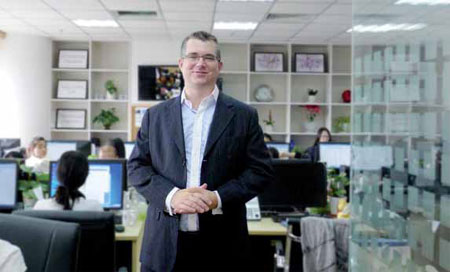Talent crunch
Updated: 2012-08-31 08:44
By Lu Chang and Li Aoxue (China Daily)
|
||||||||
Growing demand
Robert Parkinson, CEO and founder of RMG International Business Consulting (Beijing) Co Ltd, a recruitment consultancy, says that China has grown so rapidly in the past decade that the demand for talent is not able to match the potential for domestic growth.
"The US took nearly 60 years after World War II to achieve the kind of growth that China has done in 25 years. So naturally, you will be more stable if you grow more slowly," he says.
China might have a vast pool of low-cost labor, supplying everything from textiles, toys and computer chips in a short time. But the "China speed", the pace at which products are designed and factories are equipped, appears to have hit a speed bump when it comes to creating qualified graduates.
A report published in June by McKinsey Global Institute says that China will still face a shortage of about 23 million college-educated workers by 2020, despite producing the most college graduates in the world.
Fewer than 10 percent of the Chinese job candidates on average would be suitable for employment in a foreign company, the report says.
|
Robert Parkinson, CEO and founder of RMG International Business Consulting (Beijing) Co Ltd. Photos Provided to China Daily |
|
Left: Cherol Cheuk, general manager of Hudson Shanghai. Right: Sarah Jones, head of operations at Antal International China. |
Learning gap
Parkinson at RMG International Business Consulting explains why many graduates, despite good paper qualifications, are often said to be unable to adapt themselves to the working environment, which often plays a major role in the talent shortage issue.
He says the Chinese educational system focuses on learning a lot of facts and curricula rather than teaching people to think creatively.
"In China's education system there is general focus on specific experience and technical ability rather than the ability to lead, manage and market," Parkinson says.
"In the US and Europe, there has been an economic boom for the last 30 years, and halfway through that, people started to realize that it was not good to be a specialist in just one technical area. The ability to sell, think out of the box, and imbibe transferable skills are more important than knowing how the factory production line works."
Employers are facing a shortage of talent across a broad range of industries, but the fiercest demand is for skilled and experienced workers in sectors with huge growth potential.
In the accounting industry, the demand for qualified Chinese accountants has skyrocketed in the past decade, as a growing number of private and State-owned enterprises are seeking public listings both at home and abroad.
"The growing complexity of accounting management has made it difficult for audit firms to find experienced accountants," says the managing partner of a local audit firm, on condition of anonymity.
"We can't grow fast if we don't have access to qualified people."
Elisa Mallis, chair of the Human Resources Working Group of the European Union Chamber of Commerce in China, says for European companies the talent shortage is at all levels but more acute in the leadership rungs.
"In China, many people become managers much earlier than expected. So there is a lack of experience and specific leadership competencies compared with their global counterparts, especially in strategic thinking, being highly adaptive, collaborative and open and in skills related to empowerment and people development," she says.

 Relief reaches isolated village
Relief reaches isolated village
 Rainfall poses new threats to quake-hit region
Rainfall poses new threats to quake-hit region
 Funerals begin for Boston bombing victims
Funerals begin for Boston bombing victims
 Quake takeaway from China's Air Force
Quake takeaway from China's Air Force
 Obama celebrates young inventors at science fair
Obama celebrates young inventors at science fair
 Earth Day marked around the world
Earth Day marked around the world
 Volunteer team helping students find sense of normalcy
Volunteer team helping students find sense of normalcy
 Ethnic groups quick to join rescue efforts
Ethnic groups quick to join rescue efforts
Most Viewed
Editor's Picks

|

|

|

|

|

|
Today's Top News
Chinese fleet drives out Japan's boats from Diaoyu
Health new priority for quake zone
Inspired by Guan, more Chinese pick up golf
Russia criticizes US reports on human rights
China, ROK criticize visits to shrine
Sino-US shared interests emphasized
China 'aims to share its dream with world'
Chinese president appoints 5 new ambassadors
US Weekly

|

|









